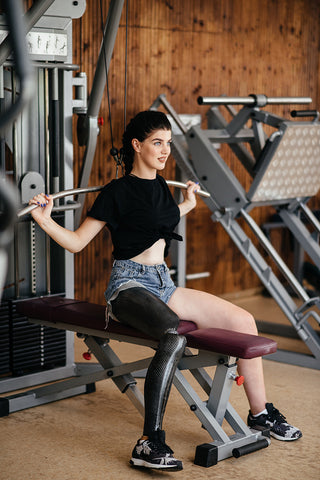5 Tips for Summertime Amputee Skin Care
Seasonal changes — spring to summer and summer to fall — present unique challenges for amputee skin care. Skin care plays a pivotal role as you maintain independence and mobility year-round. Whether it’s excess perspiration (summer) or dry skin (winter), most amputees have to make adjustments to their normal skincare routine according to the season. In the summer, hot temperatures and high humidity are the perfect conditions for excess perspiration, heat, and the growth of bacteria and fungus that contribute to a number of skin issues.
We consulted Greg Mannino, a six-time Paralympic gold medalist, prosthetist, and amputee to create a list of summertime skincare tips. With proper skin care, amputees can enjoy the summer sunshine even when the temperatures rise.
1. Cleanse, Cleanse, Cleanse
“Cleanse, cleanse, cleanse,” that’s the number one advice from Mannino. Prostheses create a ready-made breeding ground for heat-related skin issues. The environment inside the prosthesis around the skin is moist and humid with sloughing skin cells. It’s the perfect place for problematic “critters,” as Mannino puts it, like bacteria and fungus to grow and irritate the skin. They’re easy to mistake for heat rash, which can be an issue in and of itself, but good hygiene can prevent painful infections, lesions, ingrown hairs, blisters, and sores.
Most amputees already know that skin hygiene is imperative to their everyday health and success with their prosthesis. But in the summer, skin care needs a new level of attention. Amputees experience more perspiration than average because the body has to compensate for a loss of skin surface area. In addition, prostheses trap body heat and take more physical effort to use, resulting in even more perspiration.
Frequent washing of the residual, liner, and/or sock with a gentle daily cleanser that contains antibacterial and antifungal ingredients keeps the skin and the environment around it as clean as possible. Some amputees can maintain their skin health with one cleansing a day. But others may need two or three cleansing sessions or showers a day followed by regular applications of antibacterial and antifungal products to keep the skin clean.
2. Have a Cleansing Plan When You’re Away From Home
Plan to keep your residual and prosthesis clean while you’re on summer excursions. When you’re at the lake, beach, or on a mountain trail, you may not have quick access to your usual cleanser or a clean water source.
But the heat, moisture, and bacteria build whether you’re close to home or not, and heat and sweat increase bacterial growth. Mannino suggests bringing along a cleanser, liquid-to-powder, and additional socks and liners. In a pinch, a small amount of hand sanitiser can do a quick cleansing until you have access to your cleansing and moisturiser products. The point is that some cleansing, even a small amount, is better than no cleansing at all.
When you’re cleansing in an uncontrolled environment, be careful what the liner, sock, or residual touches after it’s been cleansed and before you put the prosthesis back on. Try to get everything cleaned, dried, and donned without touching surfaces that may harbor bacteria.
3. Change Liners and Socks More Often
“The real key is keeping the socket, liners, and socks clean — the cleaner, the better. The cleaner it is, the less likely you are to have skin breakdown,” says Mannino. You may need a few more extra liners and/or socks in the summer because it’s best to change them frequently. Be sure to cleanse them soon after taking them off so that sweat doesn’t cause odor or make any fabrics harden.
Clean sockets, liners, and socks are also vital because perspiration can cause them to slip and shift when you move. Not only is that uncomfortable, but it can also create sores on the residual and, “chaffing are where bacteria can enter the skin,” warns Mannino.
4. Moisturise Both Day and Night
Heat zaps moisture from the skin, and as the skin gets dry, it can alter the fit of the liner and/or sock. Moisturised skin stays supple and strong, making moisturisers a key part of summertime care. However, make sure the skin is completely dry before donning the prosthesis.
Antibacterial and antifungal moisturisers are a great daytime option because they provide hydration while fighting the growth of unwanted guests. Don’t forget about nighttime moisturization. The skin heals while you sleep, and a night moisturiser aids and promotes that healing.
5. Be Proactive if You Know the Perspiration is Coming
If you know you’re going to work hard, exert yourself, and get sweaty, advanced planning can save your skin and mobility. “In the summer months, you may need to be proactive. If you’re going to sweat more, use a liquid-to-powder preemptively,” suggests Mannino.
A liquid-to-powder product acts as your first defense against excessive perspiration and chaffing. Liquid-to-powder products go on like a regular moisturiser, but they dry to a powder, creating a protective barrier that reduces friction and irritation. These types of products also moisturise to maintain skin integrity. However, for extreme workouts or adventures, when you know you’ll be pushing your physical limits like a race or all-day hike, you can also apply an antiperspirant to your residual the night before.
Conclusion
When all is said and done, “You can prevent many of your own skin issues with good skin care and cleanliness,” says Mannino. Good skin care is part of life for amputees, but a proactive approach during the summer increases your chances of fully participating in your favourite activities. Cleanse, moisturise, and think ahead to make sure your skin stays strong enough for the rigours of life as an amputee.



